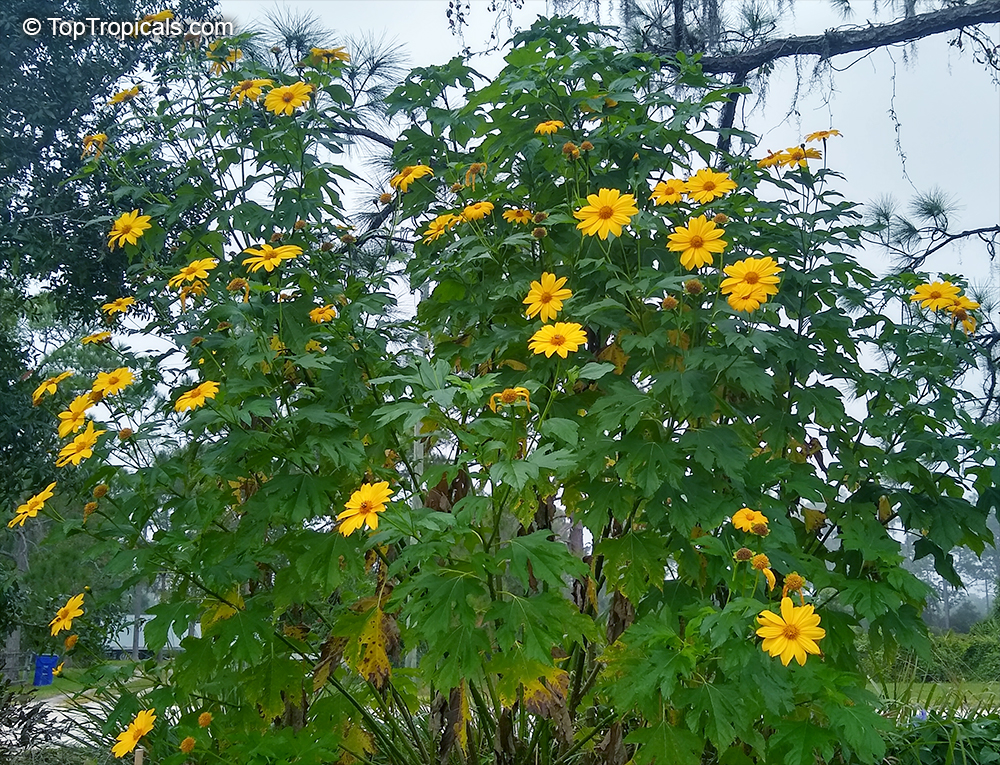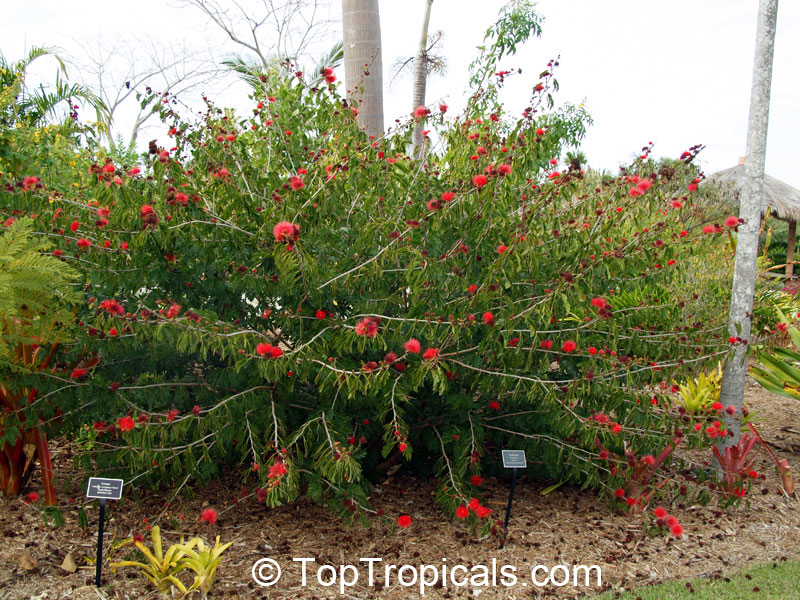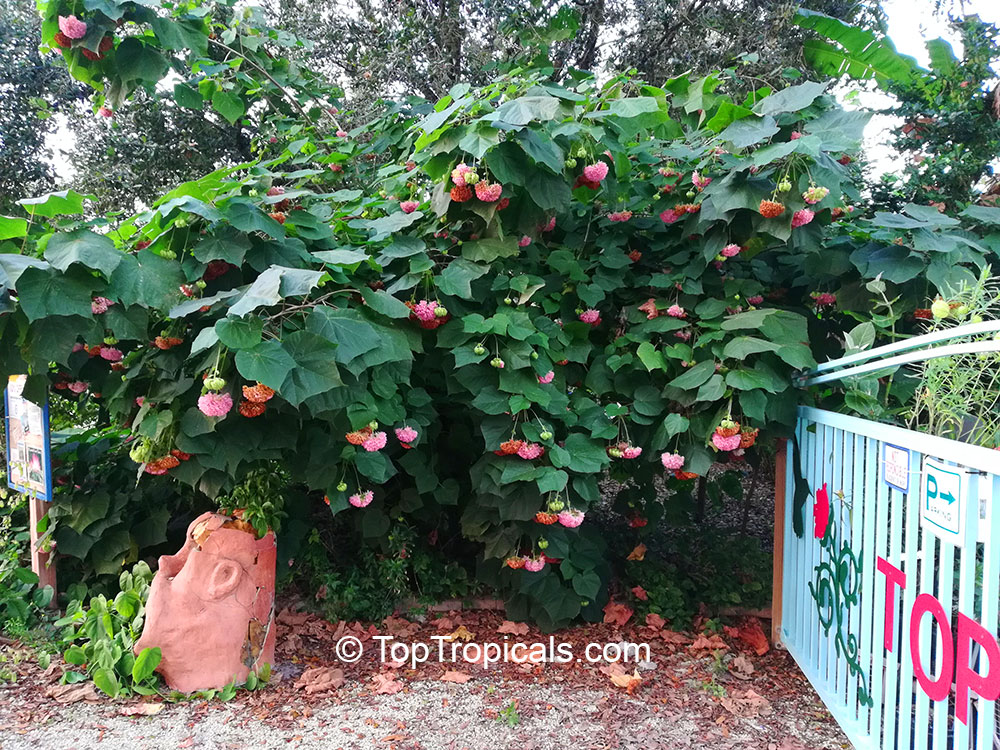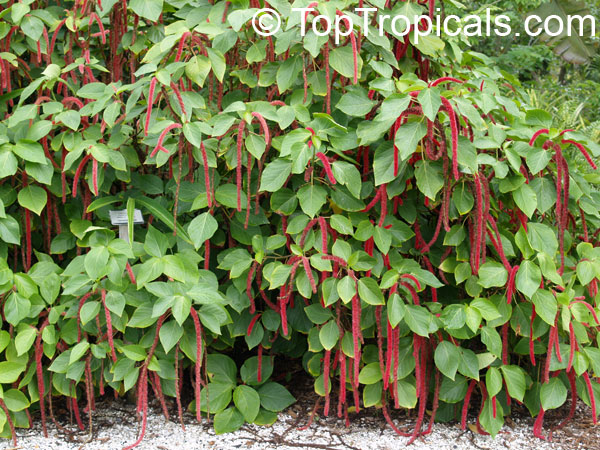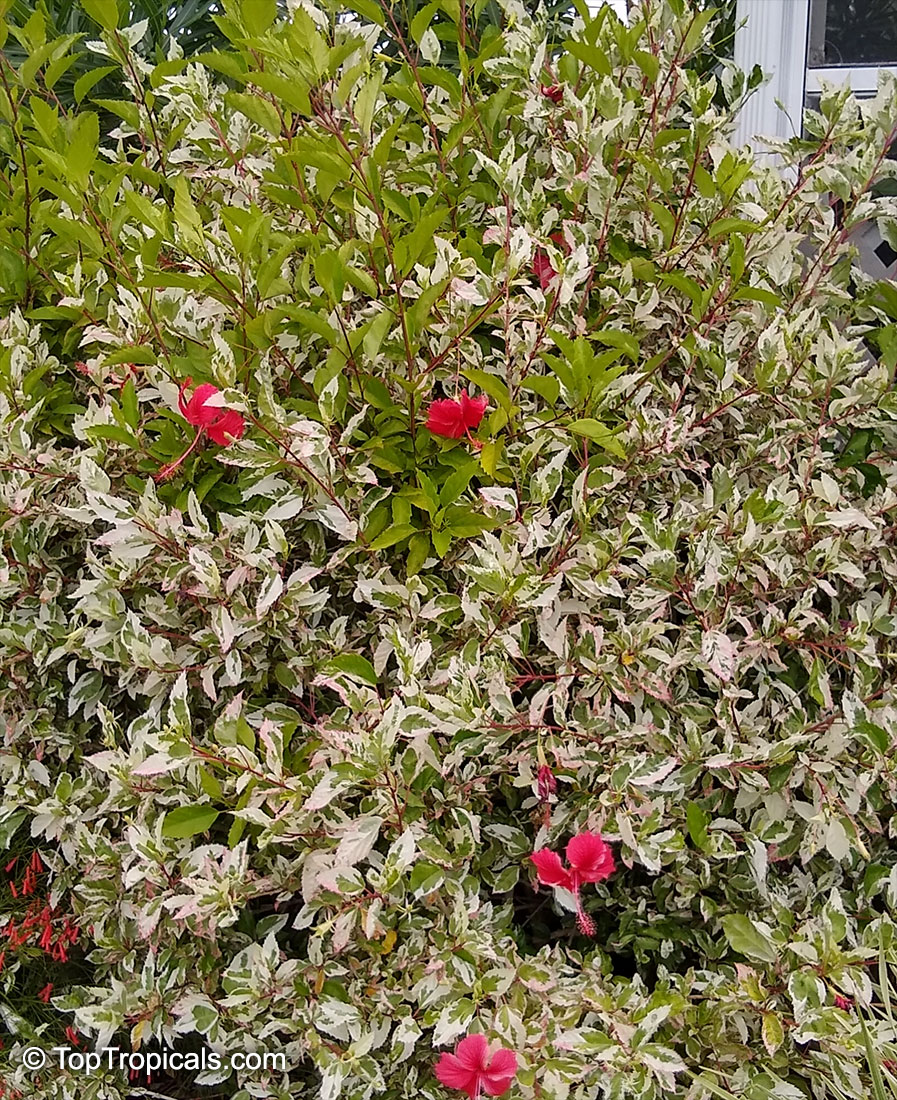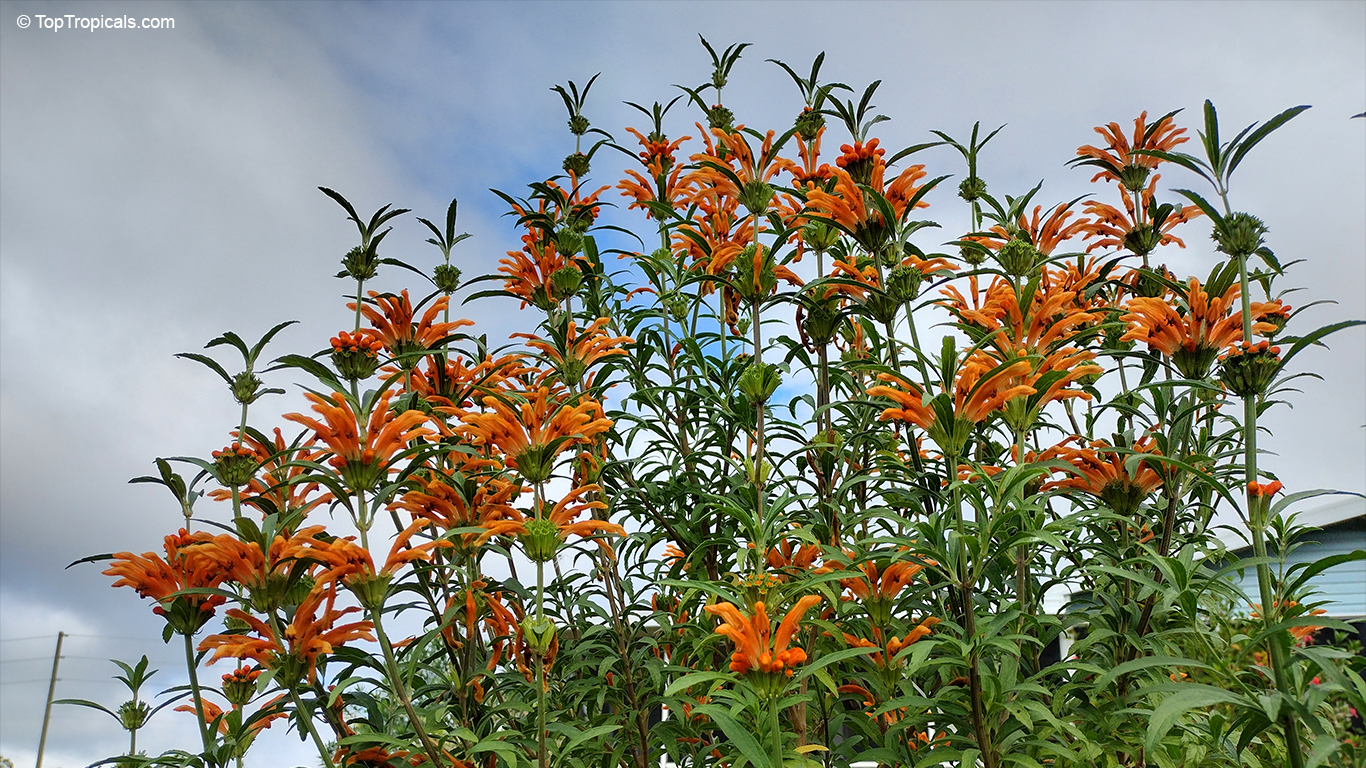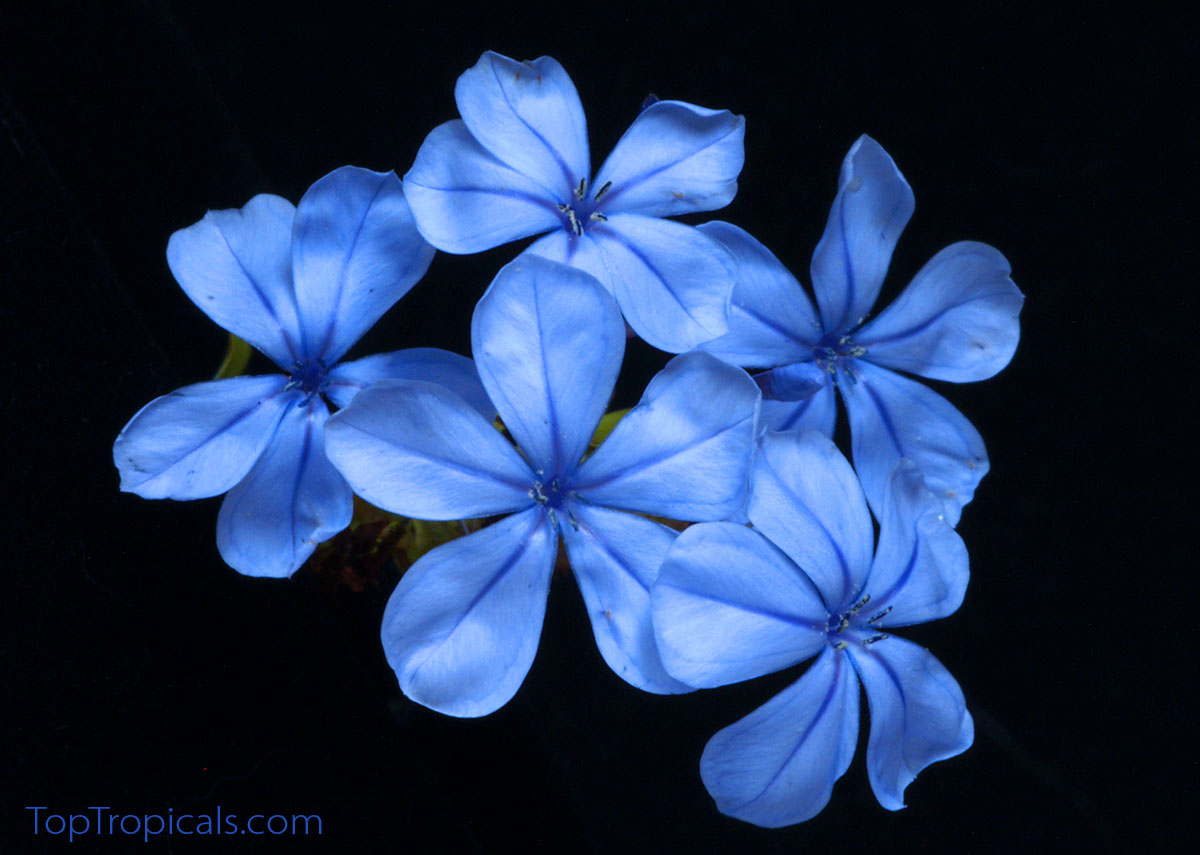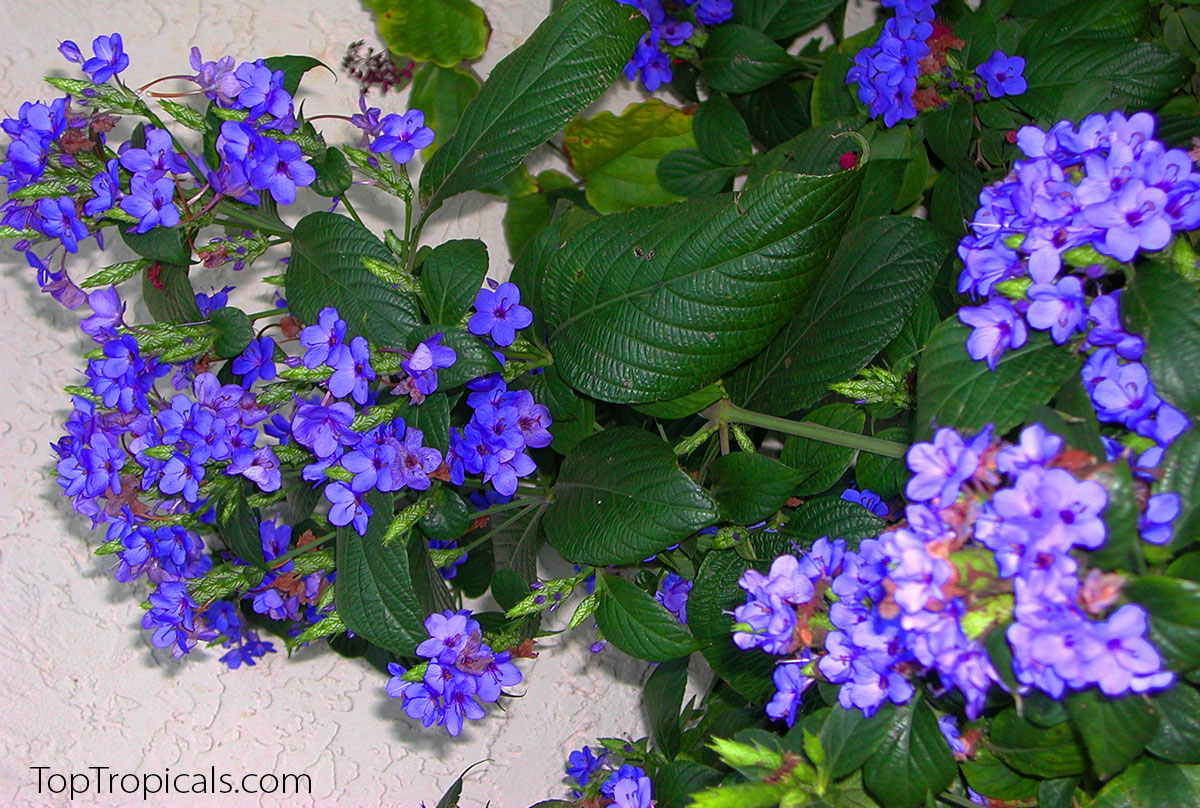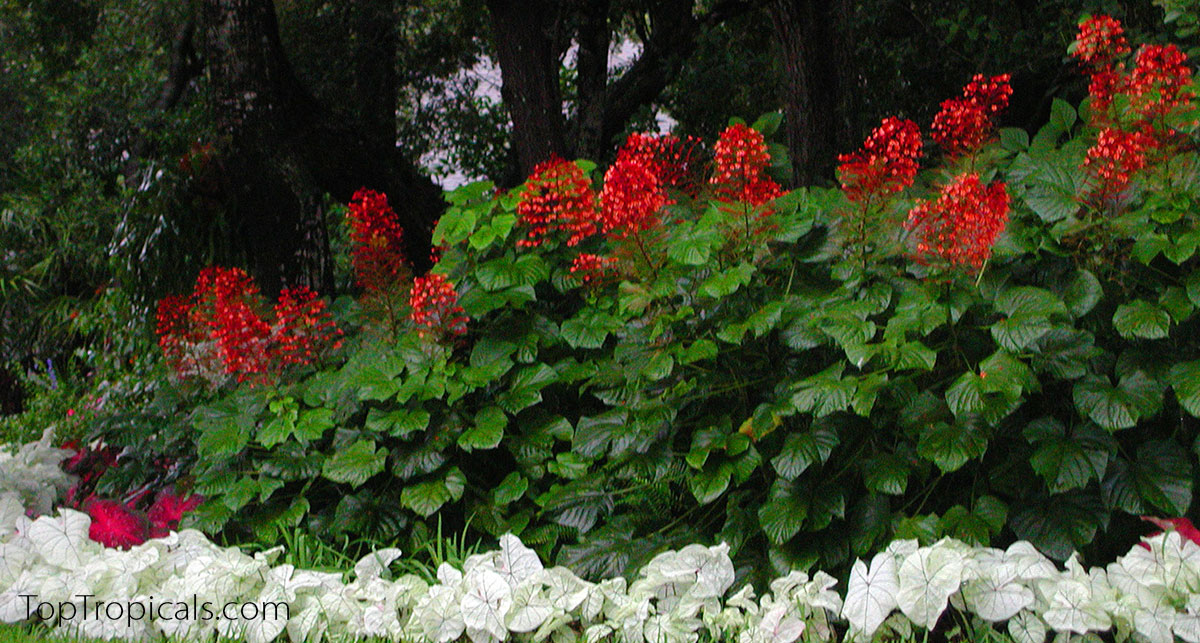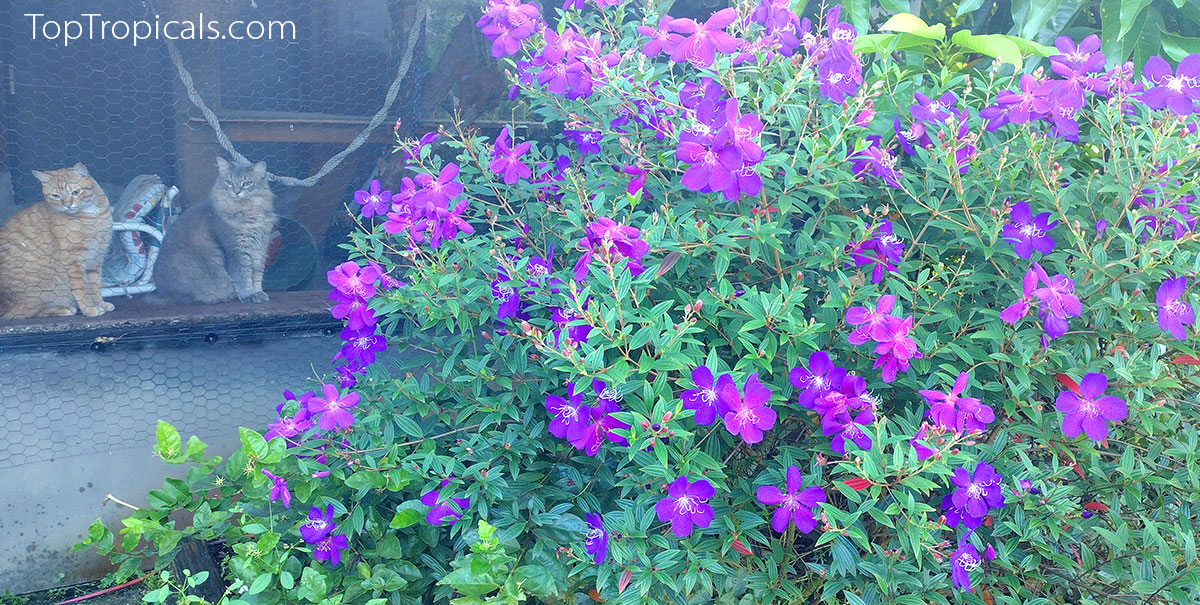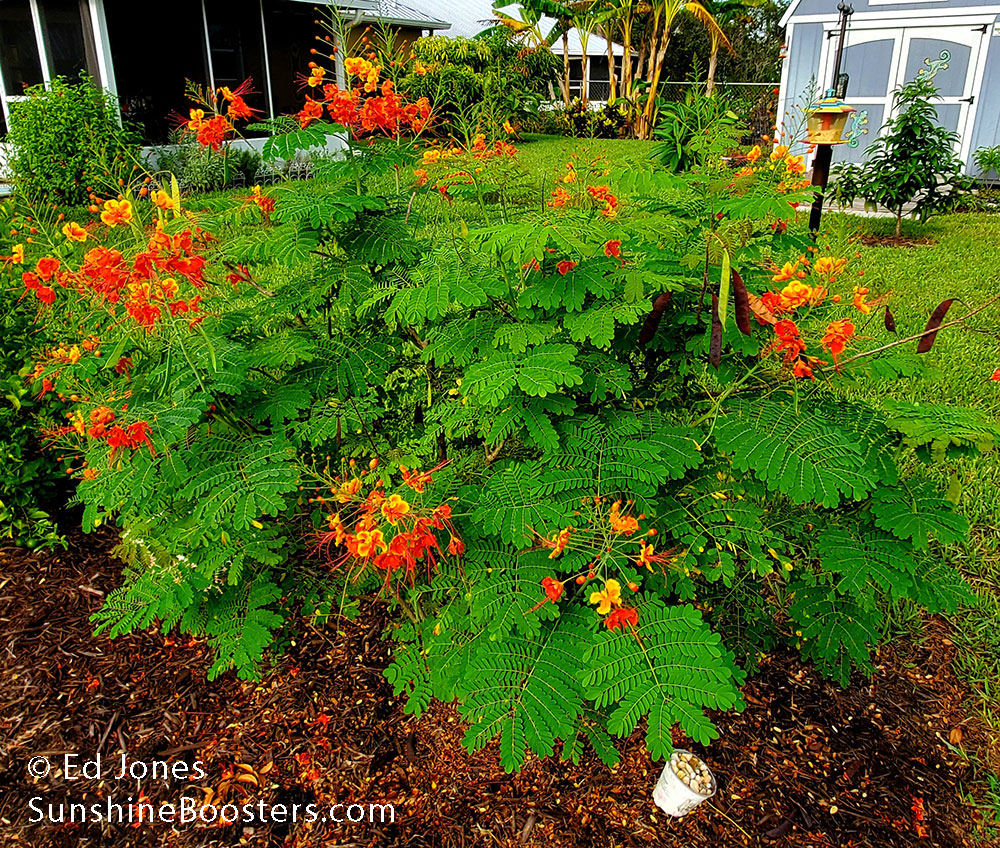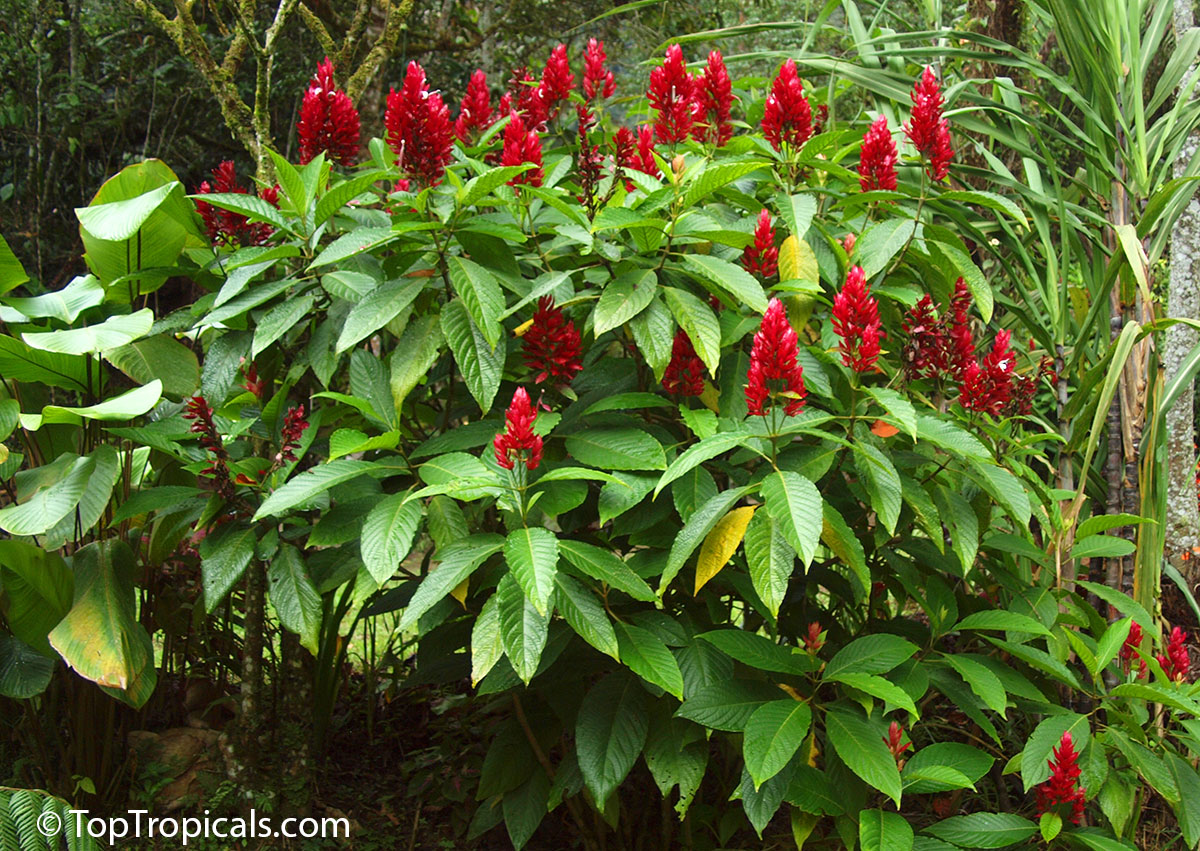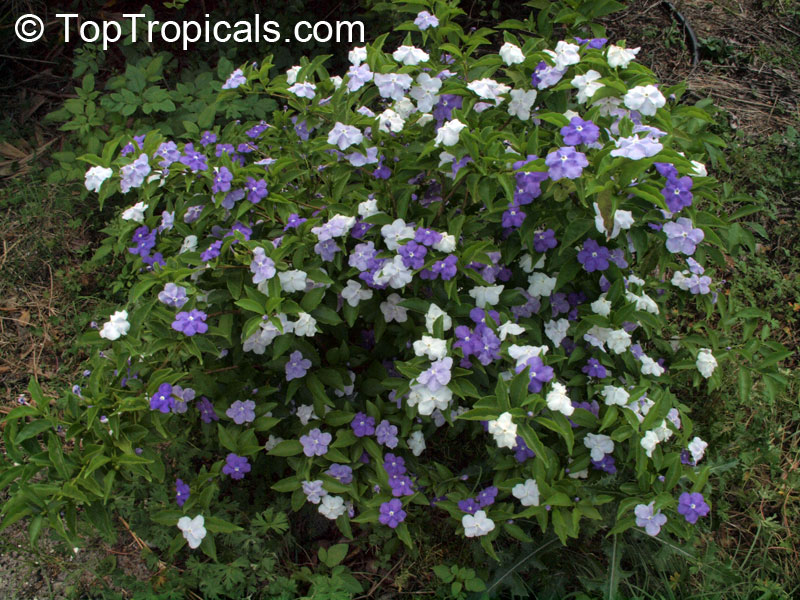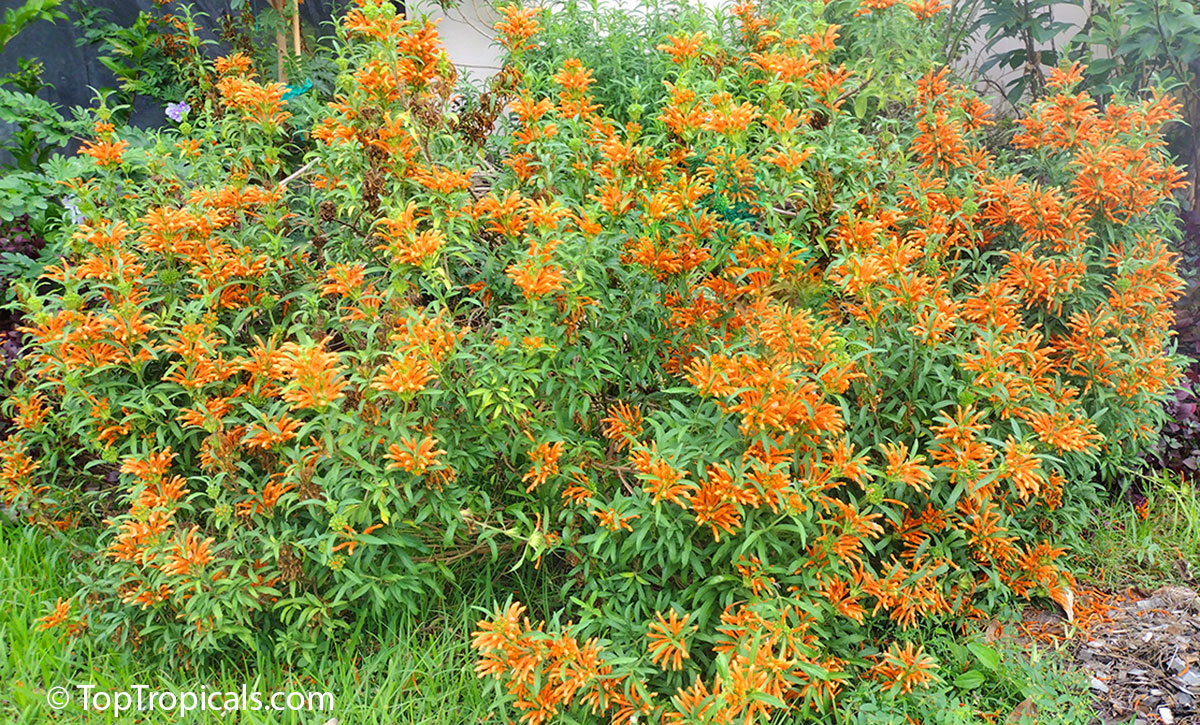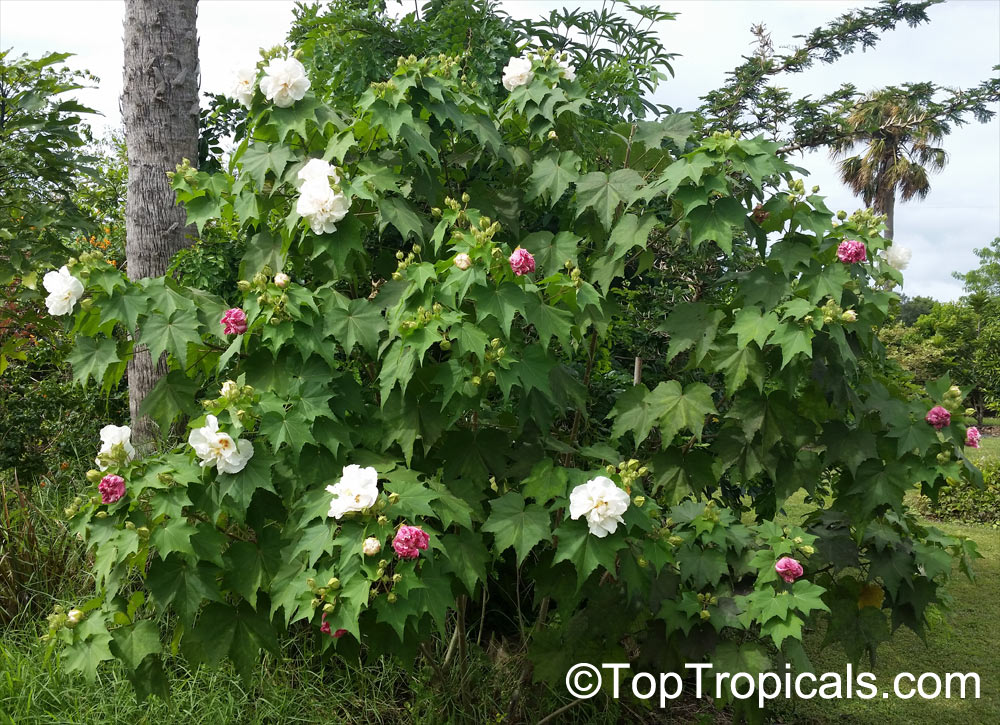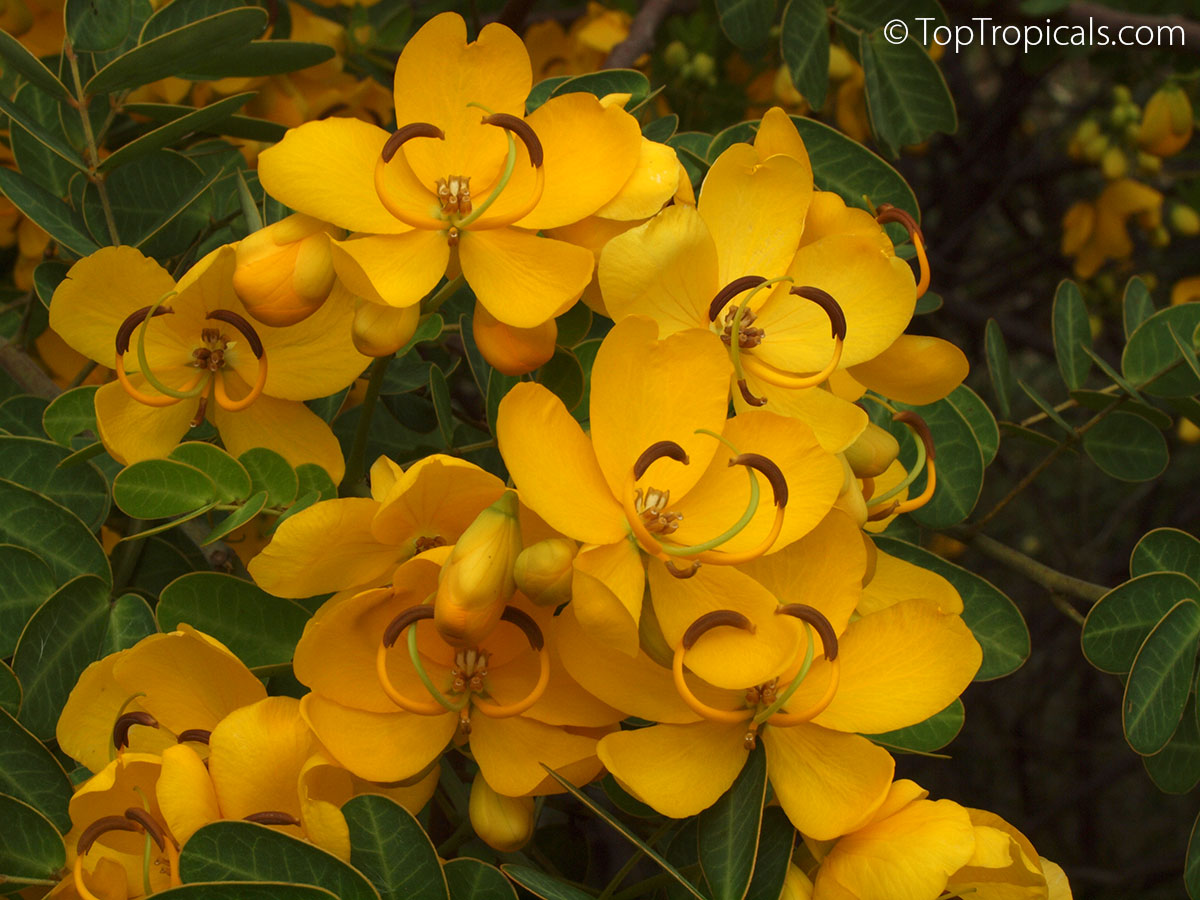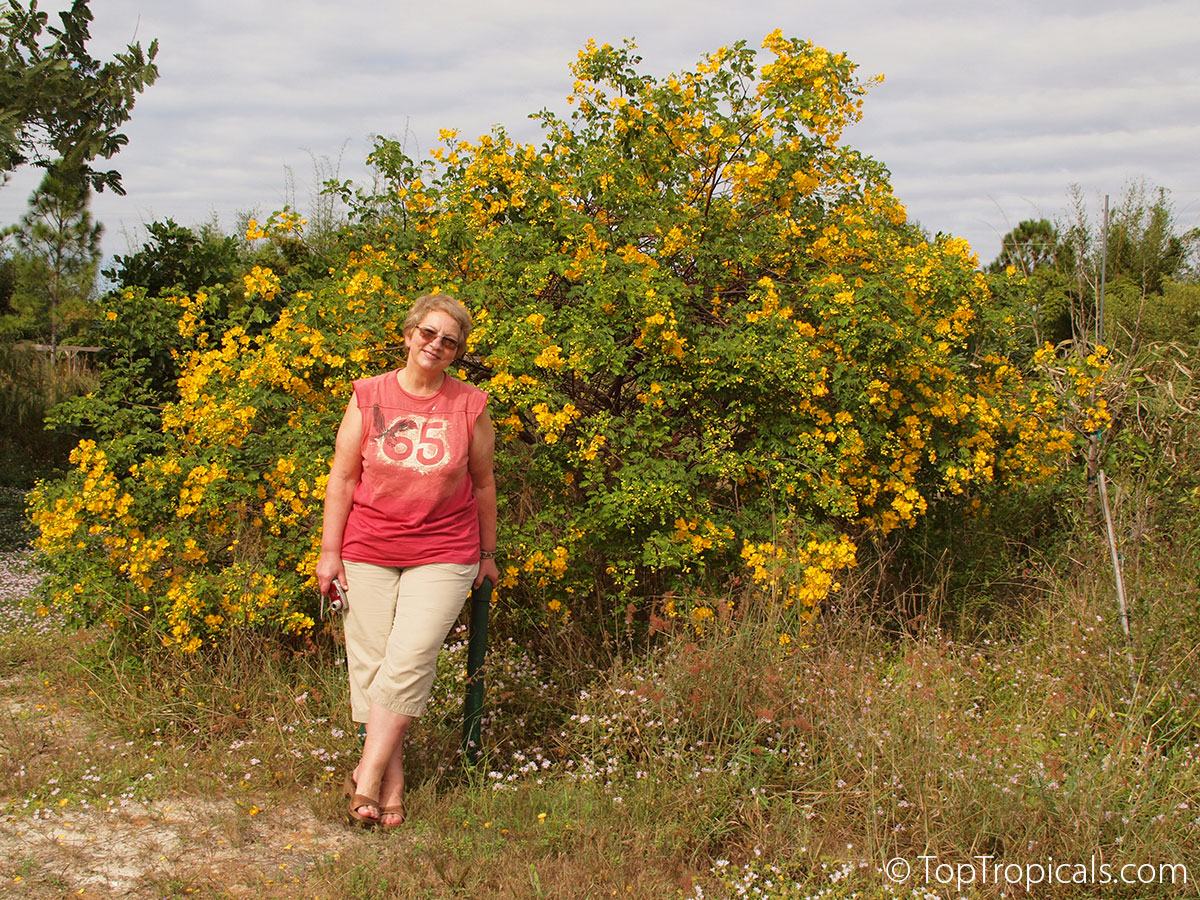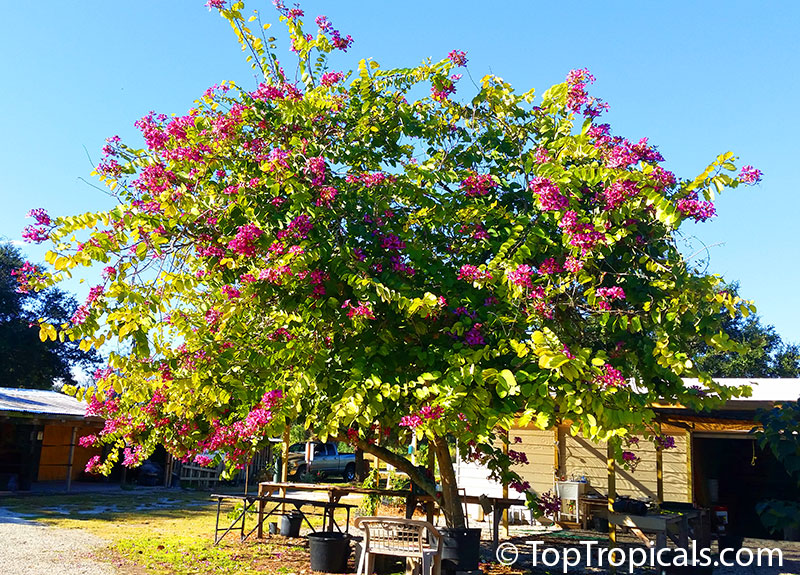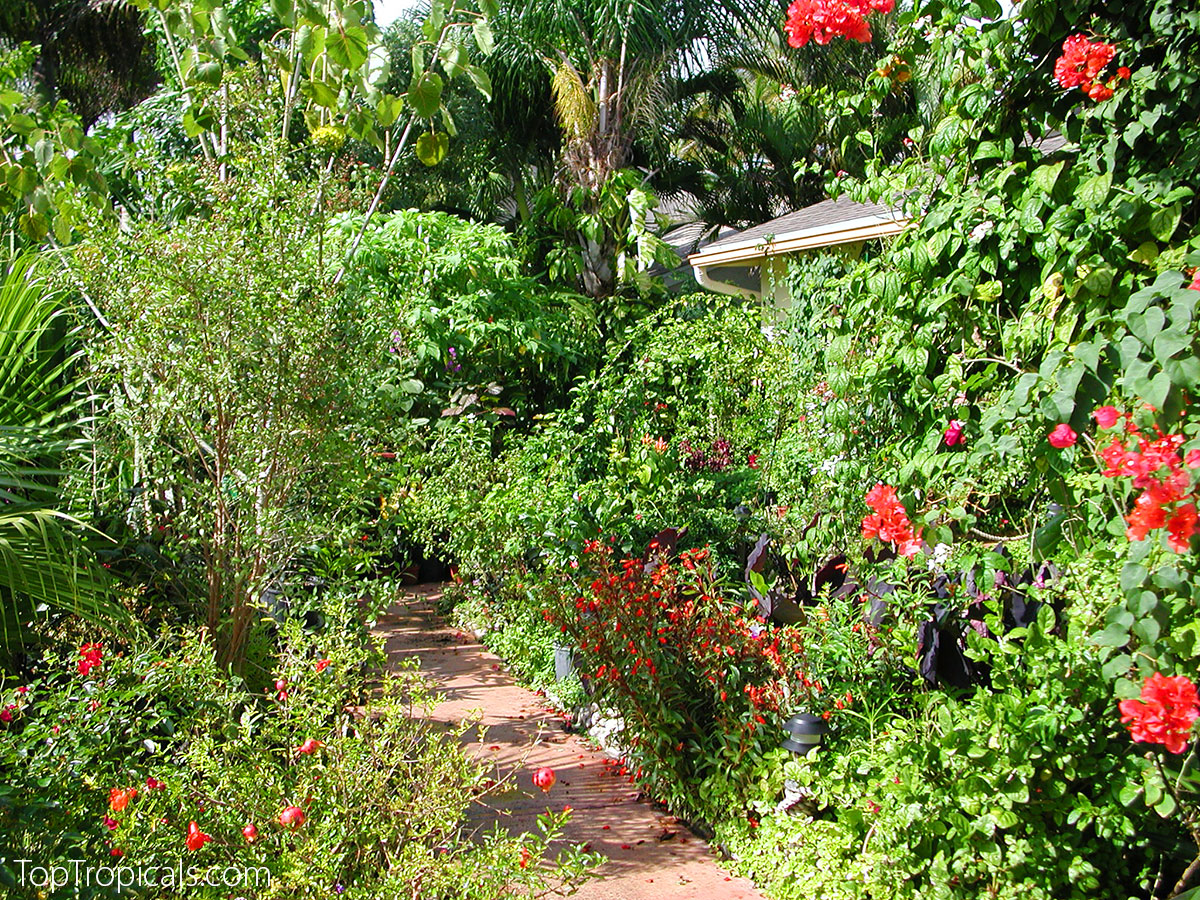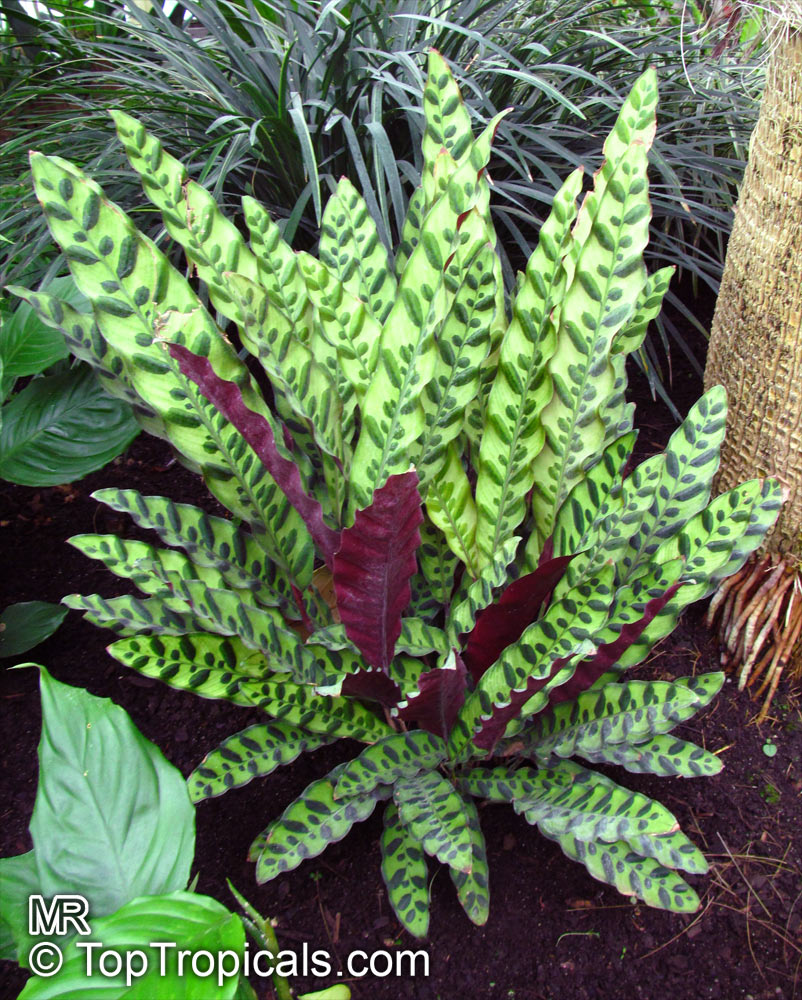Garden Blog - Top Tropicals
Date:
Privacy Hedges with Benefits
What's the numero uno question we get bombarded with at Top Tropicals Nursery? Well, it's a real head-scratcher:
Q: "...Can you recommend me a flowering privacy hedge to spice up my yard's life? My current hedge is just a green wall and I'm tired of the monthly trim routine. I need something lively, fast-growing, and unusual if possible. No plain old ixora, please!.."
A: After over two decades of being the go-to advice-givers, we thought, "Why not spill the floral beans and share our tropical wisdom?" But where to begin? The jungle of flowering ornamentals is vast, and picking the perfect shrub is like finding the missing piece of a gardening puzzle. So, in our new column "Hedges with Benefits" we're dishing on those not-so-average shrubs that'll not only prettify your patch but also bring some serious practicality. Today's lineup is -
Top Ten Winners:
Fast growing flowering shrubs
Below is the top selection of spectacular flowering shrubs that can create a nice hedge or a natural screen within just a couple of seasons.
Tithonia diversifolia - Sunflower tree.
Grows super fast to a very tall dense hedge, and starts flowering right away. Full sun, very easy, not
fussy about soil or water. Winter bloomer.
Calliandra surinamensis - Powderpuff.
Pretty pink powderpuffs almost year around! Easy to prune.
Dombeya x wallichii - Tropical Hydrangea.
You can see this beautiful bush right at Top Tropicals gate. Winter bloomer, large lush leaves and huge, pink hydrangea-like blooms. Very large and fast growing, likes water, tolerates shade.
Acalypha hispida - Cat tail, Chenille plant.
All time favorite, everblooming with red cat tails! Full sun. Easy to control.
Hibiscus variegated Snow Queen.
Popular landscape bush with unusual look, red flowers over snow white variegation, very showy! Responds well to
pruning. Full sun.
Leonotis leonurus - Lions Ears.
Winter bloomer, great for low hedges. Covered with bright orange curious flowers,
medium sized, easy to control at 3-4 ft. Full sun.
Plumbago auriculata Imperial Blue
One of the most popular Southern hedge plants, everblooming with bright blue flowers, tolerant to drought, heat, and poor soils. Can be maintained short or tall (2-6 ft).
Eranthemum pulchellum - Blue Sage, Lead Flower.
Great for shady spots, winter bloomer with dark green leaves and unusual sky-blue flowers. Can be trimmed if needed. Nice and dense.
Clerodendrum paniculatum - Pagoda Flower. Happy in the sun or shade, easy plant. Loves water.
Tibouchina lepidota - Ecuador Princess, Jules Dwarf.
Sun or shade, blooms on and off throughout the year. Beautiful Purple
Princess!
Date:
Easy compact bush for sandy soil
Caesalpinia pulcherrima - Red Dwarf Poinciana, Bird of Paradise.
Q: Can you recommend a flowering bush that will be in full sun and in sandy soil. I do not want it to exceed 10 feet.
A: For a garden specimen bush that is medium size and tolerates poor soils, we can recommend to choose from the plants below. These are all easy to grow, not fussy about soil and water, and stay compact and require minimal or no trimming at all.
Calliandra surinamensis - Powderpuff - 6-8 ft
Hibiscus
mutabilis Cotton Candy - Mallow Hibiscus - 5-6 ft
Dombeya seminole
- Tropical Rose Hydrangea 4-6 ft
Allamanda
schottii - Dwarf Allamanda Bush 3-4 ft
Brunfelsia
pauciflora Compacta - Dwarf Yesterday-Today-Tomorrow - 4-5 ft
Calliandra
schultzii - Dwarf calliandra - 4-5 ft
Plumbago
auriculata Imperial Blue
Caesalpinia
pulcherrima - Red Dwarf Poinciana, Bird of Paradise - 2-4 ft
Hibiscus
schizopetalus - Coral Hibiscus - 5-6 ft
Jatropha
integerrima compacta - 4-5 ft
Clerodendrum
bungei - Glory Bower - tolerates shade, 4-5 ft
Eranthemum
pulchellum - Blue Sage, Lead Flower (prefers shade) - 4-5 ft
Magnolia figo -
Banana Magnolia - small tree, 6-8 ft
Megaskepasma
erythrochlamys - Brazilian plume (tolerates shade) - 5-6 ft
Tibouchina
lepidota - Ecuador Princess, Jules Dwarf - 3-4 ft
Leonotis leonurus
- Lions Ears - 3-4 ft
Also, for your further reference, check out the reference chart Hedges with Benefits Chart to see different flowering bushes that are great for hedges as well as garden specimens, depending on your specific needs.
Megaskepasma erythrochlamys - Brazilian plume.
Brunfelsia pauciflora Compacta - Dwarf Yesterday-Today-Tomorrow.
Leonotis leonurus - Lions Ears.
Date:
Hedges
with Benefits
Reference Chart
Large and fast growing
Tithonia diversifolia - Sunflower tree
Acacia farnesiana
- Sweet Mimosa
Calliandra
surinamensis - Powderpuff
Aloysia virgata
- Almond Bush
Dombeya x wallichii - Tropical Hydrangea
Cornutia grandifolia - African lilac
Gmelina
philippensis - Parrots Beak
Hibiscus
mutabilis Cotton Candy - Mallow Hibiscus
Senna alata -
Empress Candle, Candelabra Plant
Medium or easy-trim
Acalypha hispida - Cat tail, Chenille plant
Bauhinia galpinii - Pride of De Kaap
Cestrum nocturnum
- Night blooming jasmine
Dombeya seminole
- Tropical Rose Hydrangea
Gardenia thunbergia - Forest
gardenia
Hamelia patens - Fire Bush
Hibiscus variegated
Snow Queen
Jasminum sambac
Maid of Orleans
Ochna integerrima
- Vietnamese Mickey Mouse, Hoa Mai
Odontonema callistachyum - Lavender Butterfly Bush
Odontonema cuspidatum - Firespike, Red
Rondeletia
leucophylla - Panama Rose
Tecoma stans - Yellow Elder
Short or slow growing
Aglaia odorata - Chinese Perfume Plant
Allamanda
schottii - Dwarf Allamanda Bush
Brunfelsia pauciflora Compacta - Dwarf Yesterday-Today-Tomorrow
Clerodendrum
incisum - Musical Note
Calliandra schultzii -
Dwarf calliandra
Gardenia
vietnamensis - Vietnamese Gardenia
Leonotis leonurus
- Lions Ears
Neea psychotrioides - Pigeon Plum, Hoja de Salat
Plumbago auriculata Imperial Blue
Garden Specimens
Combretum constrictum Thailand, Ball of Fire
Caesalpinia
pulcherrima - Red Dwarf Poinciana, Bird of Paradise
Clerodendrum
quadriloculare - Winter Starburst
Euphorbia
leucocephala - Snows of Kilimanjaro, Pascuita
Gardenia nitida - Shooting Star Gardenia
Hibiscus schizopetalus - Coral Hibiscus
Jatropha integerrima compacta
Kopsia fruticosa - Pink Gardenia
Malvaviscus x penduliflorus
Variegata - Summer Snow
Mussaenda philippica
x flava - Calcutta Sunset (Marmelade)
Plumeria pudica - Bridal Bouquet
Semi-Shade to Shade
Clerodendrum bungei - Glory Bower
Clerodendrum
paniculatum - Pagoda Flower
Eranthemum pulchellum - Blue Sage, Lead Flower
Clerodendrum
speciosissimum - Java Glorybower Mary Jane
Justicia carnea
- Pink Brazilian Plume, Jacobinia
Magnolia figo -
Banana Magnolia
Megaskepasma erythrochlamys - Brazilian plume
Thunbergia erecta - Kings Mantle
Tibouchina lepidota - Ecuador Princess, Jules Dwarf
Edible Hedges
Eugenia uniflora - Black Surinam Cherry Lolita
Camellia sinensis
- Tea Leaf
Hibiscus
sabdariffa - Flor de Jamaica, Karkade Sorrel
Laurus nobilis - Bay Leaf
Manihot esculenta
- Yuca Root
Nashia inaguensis
- Moujean Tea, Bahamas Berry
Sauropus androgynus - Katuk, Tropical Asparagus
Sauropus Variegata - variegated Katuk
Date:
Butterfly Bush: Fast, Pretty, Low Maintenance...
Five unbeatable reasons to plant Butterfly Cassia
Q: I am trying to find some easy flowering shrub to screen the ugly corner of my neighbor's yard, can you suggest something fast growing and pretty?
A: One of our favorite flowering shrubs in Florida is the Cassia bicapsularis, commonly known as Scrambled Egg Bush or Butterfly Bush. It is one of the most desirable plants for the southern landscape. It has all the benefits any gardener may dream of, whether a beginner or an expert:
1. Very fast growing, can screen unwanted views and create a beautiful flowering hedge. Cassia bicapsularis is known for its rapid growth, making it an excellent choice for quickly transforming an unsightly corner into a vibrant and lush area. Its dense foliage and attractive yellow blooms add both beauty and privacy to your outdoor space.
2. Easy to grow, not fussy about soil or water, drought and flood tolerant, cold tolerant. Butterfly Bush is incredibly adaptable and resilient. It thrives in a variety of soil types, is not demanding when it comes to water, and can withstand both drought and occasional flooding. Additionally, it is cold tolerant and can withstand occasional frosts once established.
3. Blooms for many months, featuring especially in winter flowers from Fall to spring. Very pretty, large "sunny" flowers resembling bright yellow butterflies, hence the name. It is a generous bloomer, gracing your garden with vibrant yellow flowers for an extended period, particularly from fall to spring. The large, sunny blooms not only add visual appeal but also attract pollinators, enhancing the ecological balance of your garden.
4. Attracts lots of butterflies. As the common name suggests, the Butterfly Bush is a magnet for butterflies. If you enjoy the presence of these beautiful winged creatures in your garden, planting Cassia bicapsularis is an excellent way to encourage and support butterfly populations.
5. Low maintenance. Butterfly Bush can be trimmed and controlled at the desired shape if needed, but if you have room for a big bush in a full sun area - just let it go and it will form a nice dense bush without any pruning: this shrub is a low-maintenance delight. While it can be pruned and shaped according to your preferences, it also flourishes when left to grow naturally. Its ability to form a dense and attractive bush without constant pruning makes it an ideal choice for those seeking a fuss-free gardening experience.
If you're looking for a fast-growing, low-maintenance, and aesthetically pleasing solution to screen an unsightly corner, Cassia bicapsularis is an unbeatable choice. It ticks all the boxes for a beautiful and resilient flowering shrub in the southern landscape.
"...Without a doubt, Butterfly Cassia became one of my favorite plants during my visit to Florida for Christmas a few years ago. I only wish I could have taken it back home with me to Latvia. If only my windowsill hadn't already reached its greenhouse capacity!.." - Alex Butova.
To see more options for flowering shrubs, check out the reference chart Hedges with Benefits Chart.
What is a good plant for a fragrant elegant hedge? Discover the Angel Hair Jasmine
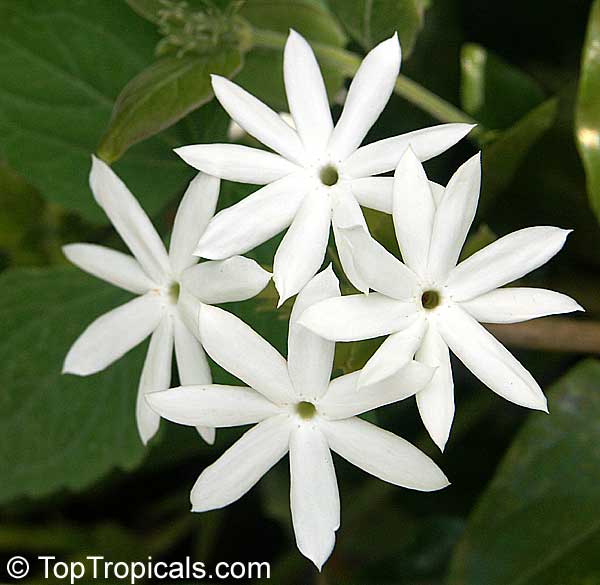
Jasminum pubescens (multiflorum) - Angel Hair Jasmine
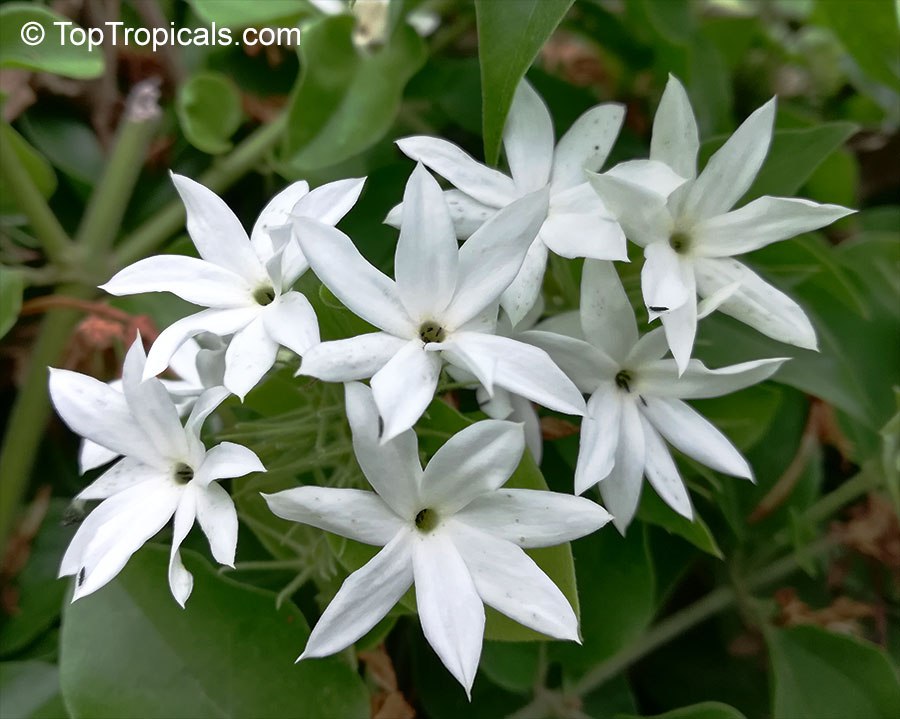
Jasminum pubescens (multiflorum) - Angel Hair Jasmine
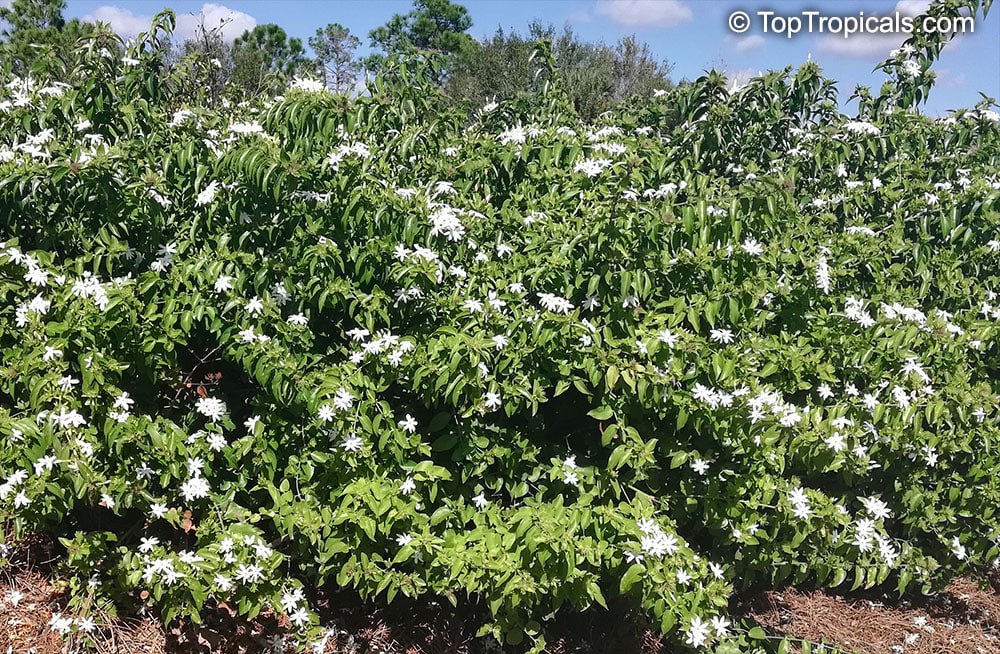
Jasminum pubescens (multiflorum) - Angel Hair Jasmine
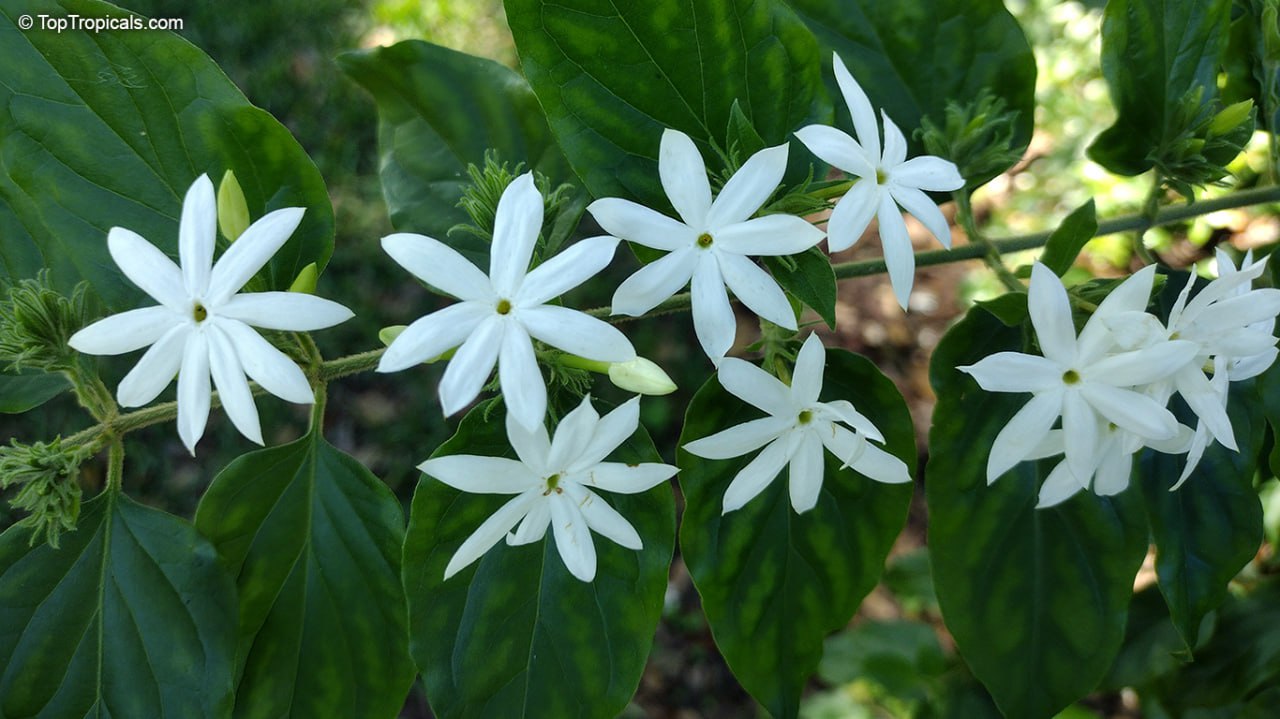
Jasminum pubescens (multiflorum) - Angel Hair Jasmine
- 💮 Jasminum pubescens (multiflorum), also known as Angel Hair Jasmine, is a beloved choice for landscapes, prized for its multitude of exceptional qualities.
- 💮 Bushy, dense vining shrub with star-like white flowers emitting a delightful fragrance.
- 💮 Soft, velvet-like leaves add to its charm.
- 💮 Rapid growth makes it ideal for creating lush hedges or adding vertical interest to garden spaces.
- 💮 Perfect for hedges, fences, or trellises, adding a touch of beauty and fragrance to any outdoor setting.
🛒 Make a fragrant hedge with Angel Hair Jasmine
#Hedges_with_benefits #Perfume_Plants
🏵 TopTropicals
Date:
How to get shade quickly... and stay away from oaks
Q: I just moved from Tennessee into a new house in Florida and there are no trees on the property, the yard is brutal hot. What can I plant so I have some shade real quick? I like Florida shady oaks, how long will they take to grow?
A: First
of all, do not rush into oak solution. Oaks are beautiful shade trees, however
they have at least 2 problems:
a) Oaks are slow growers and unless you are willing to wait some 20
years... you won't get that desirable shade that quickly.
b) We have hurricanes in Florida... sometimes. A hurricane can damage
any tree, however with oaks it may be the worse case scenario - the branches
of those giant trees are huge, hard and heavy and in unfortunate situation
when you need to remove or trim a broken tree, it may cost you... a few thousand
dollars.
These are solutions that are more economical and practical:
1) Selection. If you have room, get one of these most popular Florida shade trees: Royal Poinciana, Golden Shower, Hong Kong Orchid Tree, Red Kapok, Bottlebrush, and many others. See full list of fast growing shade trees. Or simply get a Mango Tree and have delicious fruit too! Many varieties of Mangos are very large and fast growing.
2) Do it right. Even if you are planting a smaller tree, 1-3 gal
size, it may become a nice shade tree within 2-3 years and start providing
your driveway with desirable shade. The keys for fast growth are -
a) Good soil. Dig as big hole as possible and fill it with good
rich soil containing compost. See planting instructions PDF.
b) Water. Do not rely on sprinklers and rains. Water your tree
daily for the first week, then at least twice a week for another month. After
that, irrigation system will be enough.
c) Fertilizer. Put a few handfuls of fertilizer in a planting hole. Then fertilize once a month during warm
season. Apply micro elements for even better results and faster growth.
3) Ask experts. Contact our office for advice. We will suggest the most suitable shade tree for your yard based on features of your property: location, soil, exposure, etc.
Date:
🏡 To Use Your Garden Or Be Used By It

Smokey and Sunshine November Planting.
Smokey: Winter roots make spring easy. Keep that plant straight.
Sunshine: I am keeping it straight by not touching it at all.
Smokey: That is exactly what I was afraid of.
November is the month when the garden finally stops yelling at you. The heat backs off, the bugs calm down, and the weeds take a breath. This is when we get to take control again. And as gardeners, we know the truth: Either you use your garden, or your garden will use you in spring. Let me walk you through this, gardener to gardener.
"November is when the garden finally listens. Give it a little direction now, shape it, guide it, and prepare it for spring. It will reward you all year." - Tatiana Anderson, Top Tropicals Plant Expert
🌴 When The Garden Uses You
We have all lived this scene:
- March weeds appear, and two days later it looks like a jungle.
- One missed watering turns into five wilted plants and a full week of recovery.
- A skipped feeding shows up as yellow leaves and panic searching online.
- Bugs return fast, and suddenly you are washing leaves every other day.
- Random plant purchases fill your yard with chaos and mismatched care needs.
- When the garden takes control, spring feels like hard work, not joy.
Overgrown Tropical Garden Showing How a Garden Can Use You
📊 When You Use Your Garden
November flips the script. Plants slow down. Soil stays warm. This is the safest month to experiment, move plants, fix mistakes, and redesign.
What you do now pays off huge in March.
- You map out sun zones and shade zones.
- You mulch now so weeds do not explode later.
- You move plants to better positions without heat stress.
- You remove the high-drama plants before they start another season of complaints.
- You pick what you want for next year instead of letting impulse buys rule you.
Spring becomes smooth instead of overwhelming. And honestly? It feels good to walk outside in March and see order instead of chaos.
In the photo: Every garden starts in small steps. Biquinho Pepper (front) in the garden.
What Benefit Do You Get Personally?
- Less watering.
- Fewer bugs.
- Bigger fruit.
- Better flowering.
- Less money wasted.
- Less time fixing problems you could have prevented now.
This is why experienced tropical gardeners adore November.
In the photo: Organized Tropical Garden. Firebush (lemon gold variety) and Cordylines (Ti Leaf) make colorful spots in the garden.
🐭 Start With Something Small Today (5 Minutes)
Pick one:
- Add mulch to the driest spot in your yard.
- Cut one dead branch from any tree.
- Move one pot to a better sun angle.
- Pull three weeds from the worst area.
- Water deeply once this week.
Small steps now save hours later.
⭐ One Short Story
Last year we planted a Star Fruit in November. By March, it was already covered in flowers, and have been harvesting fruit non-stop since then! That is what winter planning does: it gives plants a head start you can actually see.
🐍 Plants That Will Use You If You Let Them
These are great plants, but only if you plan before planting them:
- Banana (thirsty)
- Hibiscus (hungry)
- Brugmansia (sensitive)
- Passion vine (takes over anything it touches)
Place them wrong, and they become full-time jobs.
In the photo: Passion Vine taking over the swing.
🐰 Plants That Work For You
These feel like free upgrades to the yard:
- Moringa - grows almost on autopilot
- Star Fruit - continuous production
- Dragon Fruit - minimal effort for big results
- Cattley Guava - cold hardy, compact and fruitful
- Loquat - fast fruiting and hardy
- Mulberry - very cold hardy with fruit abundance
- Tabebuia - spectacular winter colors
- Brunfelsia - reliable night fragrance in shade
- Adenium - perfect container showstopper
- Jasmine - instant fragrance
- Mexican Flame Vine - fast growing yet controllable vine
- Wiri Wiri and Biquinho Peppers - always available for your kitchen
- Firebush, Hamelia - everblooming and hardy butterfly native
- Cordyline Ti Leaf - instant leaf colors
- Megaskepasma Brazilian plume - lush tropical foliage with red blooms in shade or sun
- Iris - hardy easy low-growing native for any soil
- Champaka, Joy Perfume Tree - legendary perfume tree that blooms almost year round
- Olive tree - maintenance-free source of olives
- Plumeria - instant Hawaiian perfume flowers all summer
- Dombeya - spectacular hydrangea-like blooms all winter
- Insulin Ginger - instant nature remedy
- Eugenia Cherries and Barbados Cherry - immediate fruit, compact trees for small gardens or pots
- Peanut Butter tree - exotic sweet fruit like peanut butter, compact tree
- Blackberry Jam fruit - exotic fruit like blackberry jam, very small tree
- Colocasia - instant tropical look with Elephant ears
- Strawberry tree - sweet cotton-candy fruit year around
- Papaya - fits any yard, delicious fruit and natural digestive remedy
Pick even one of these and your garden starts giving back.
In the photo: Cattley Guava brings not only tasty fruit but also a wonderful character with its amazing multi-color twisted trunk.
🌡️ November Advantage
You cannot ruin anything in November. This is the safest, calmest month to shape your garden the way you want. If you act now, spring becomes a victory lap. If you wait, spring becomes a rescue mission.
In the photo: Adenium is a colorful accent in the garden.
💐 Thanksgiving Tie-In
This is the season to reset, breathe, and be thankful for your outdoor space. A garden that works for you is one of the best gifts you can give yourself going into the new year.
Start your November plan today. Use your garden. Do not let it use you.
In the photo: Megaskepasma, Iris, Colocasia, Crotons, Dracaena and Ti Leaf bring instant tropical look to your garden.
Date:
Full Sun Garden vs Shade Garden
"Someone is sitting in the shade today because someone planted a tree a long time ago." (Warren Buffett)
Q: I live in California and I have a large area of my garden in full shade. Are there any plants that will be happy there? I am looking for something colorful. I also have a smaller area in front of the house that has full sun almost all day long, but I am afraid this can be too hot for flowering plants? Can you recommend something?
A:
Full sun gardens have a strong, bright look while shade
gardens have cooler, subdued appearance. Both types of
gardens are fun to design and maintain as long as you pick
the right plants.
Full Sun Garden is the easiest to grow. Depending
on exposure, it may require some plants that can tolerate
the hottest summer days and the dry conditions in your
area. The good news is, the majority of tropical and
subtropical plants prefer full sun, so you have a large
selection to pick from - fruit trees, flowering trees,
shrubs, vines, and small perennials. The more sun, the
more flowers and fruit you will get! However, keep in mind
that sun gardens require more water, but generous mulching
will help to minimize watering.
Shade Garden is much more restful in appearance,
but sometimes may be a little more difficult to work with.
As shade trees grow bigger and thicker, it may become too
dark; nothing will grow in total darkness. In this case
you need to prune back some branches to let more light in.
Filtered sunlight or dappled light coming through the
leaves of the trees is beneficial and considered light
shade, which would be the best light conditions for shade
loving plants to thrive. Although shady cooler spaces
attract more insects and will require more attention to
control them, they also have some advantages over sun
gardens. You can enjoy working in cooler conditions, and
your garden will require less water. Many foliage plants
look more deeply colored and healthier than in full sun;
white flowers shine instead of looking washed out!
Our favorite shade plants are fragrant brunfelsias , clerodendrums, and of course
colorful gingers and heliconias. You
may also consider ornamental foliage of Calatheas, lush Alocasias, Colocasias, and colorful Cordylines. Check out our shade loving plant list for
more colorful suggestions. These are also great for indoor
gardens!
Gardeners finally found a perfect everblooming hedge for shade!
Kings Mantle - Thunbergia erecta
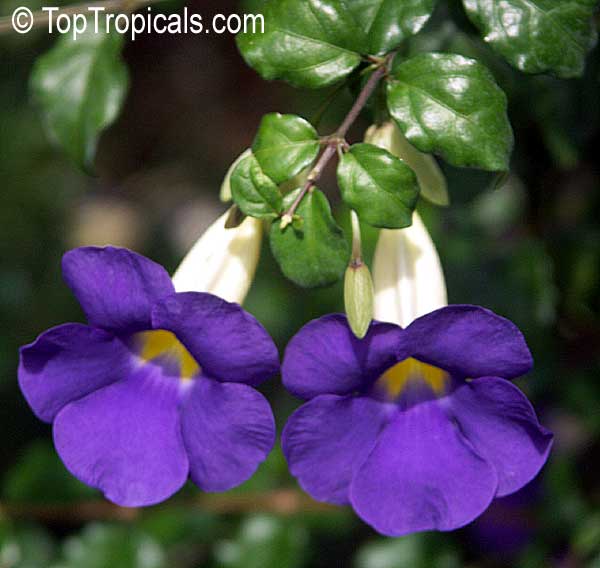
Kings Mantle - Thunbergia erecta purple
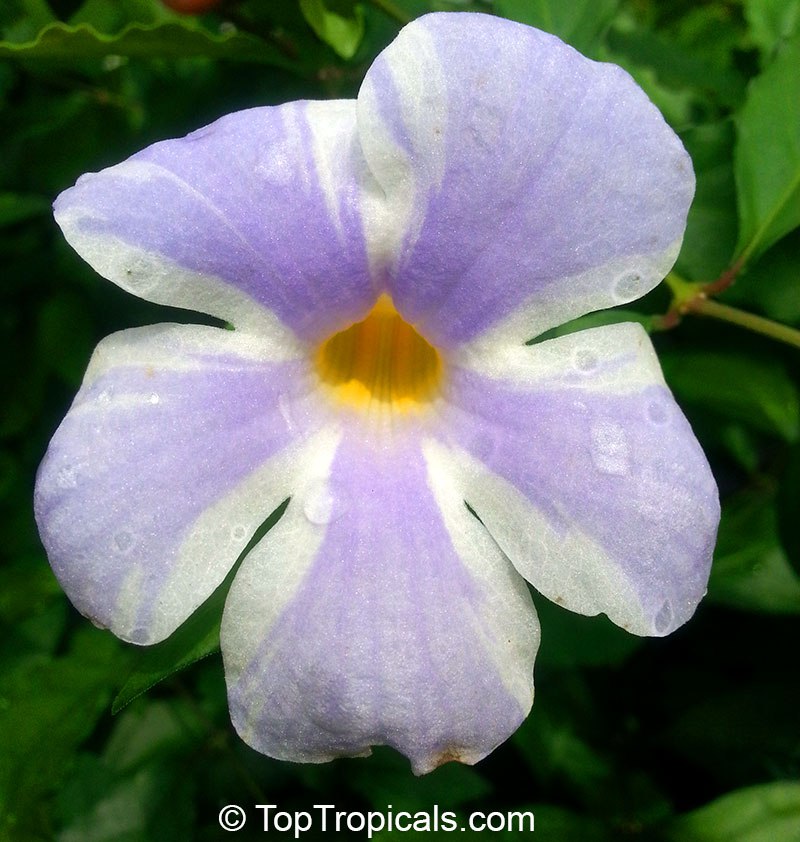
Kings Mantle - Thunbergia erecta Lavender Lace Variegated
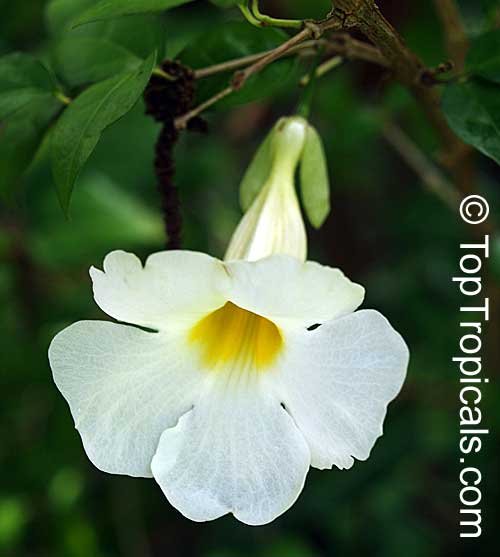
Kings Mantle - Thunbergia erecta White
- 💜 Kings Mantle - Thunbergia erecta - is a perfect flowering bush or hedge for the shady garden.
- 💜 Ever-blooming: Perfect for a continuously blooming hedge.
- 💜 Dense shrub: Bushy, fast-growing, and ideal for mixed beds or medium-to-low hedges.
- 💜 Beautiful flowers: flowers resemble morning glories, with common varieties having rich purple petals and yellow throats.
- 💜 Attractive foliage: Small, dark green leaves.
- 💜 Climber relatives: Unlike many Thunbergia species, this one is a sprawling shrub.
- 💜 Pruning responsive: Can be shaped into a dense hedge, pruning promotes flowering.
- 💜 Sun or shade: Prefers bright light and well-drained soil, but will also bloom in partial shade.
- 💜 Colors: comes in dark blue, white, and the unique, vigorous variegated variety - 'Lavender Ice'.
🛒 Shop King's Mantle
#Perfume_Plants #Hedges_with_benefits
🏵 TopTropicals
What is your favorite variety of Jasmine Sambac?
Jasminum Sambac varieties
- 💮 Jasminum Sambac is hands-down the queen of fragrant flowers. The scent is heavenly - so much so that it's the key to jasmine perfume and the secret behind authentic jasmine tea.
- 💮 Jasmine sambac comes in all shapes and sizes - from neat little shrubs to big, vigorous bushes and even climbing vines. Every variety shows off a different flower form. It’s happy in sun or shade, perfect for pots, and loved as an indoor plant.
- 💮 At TopTropicals we love them all, but these three are our favorites:
- Belle of India - with elegant long petals
- Arabian Nights - vigorous yet compact, always covered in blooms
- Little Duke - same big carnation-like flowers as Grand Duke, but in a smaller, tidy package
- 👉 At Top Tropicals, we grow every known variety of Jasminum sambac in cultivation:
❓ Which one would you choose for your garden?
- ✔️ Arabian Nights - compact slow growing shrub with small delicate flowers
- ✔️ Belle of India - compact vine with long elegant petals, shade lover
- ✔️ Grand Duke of Tuscany - the most popular, vigorous bush with carnation-like flowers
- ✔️ Grand Duke Supreme - bigger, more vigorous version of Grand Duke with larger flowers
- ✔️ Gundu Malli - new hybrid between Arabian Nights and Grand Duke
- ✔️ Little Duke - more compact version of the Grand Duke
- ✔️ Maid of Orleans - vigorous full sun climber, great for hedges and fences
- ✔️ Mali Chat - very delicate, rare variety, with miniature 3-tier flowers, not easy to establish, shade lover
- ✔️ Mysore Mulli - vigorous vining shrub for sunny or semi-shade locations
- 👉 To get more flowers, just use Sunshine Pikake plant booster and enjoy the perfume all day long!
🛒 Smell the Difference – collect Sambac varieties
- 📚 Learn more:
▫️The most wanted fragrant plant
📚 Jasminum Sambac Absolute Flower - book download
#Perfume_Plants #Hedges_with_benefits
🟢 Join 👉 TopTropicals

